Coming from a completely “jazz-less” background I never understood “what the fjuzz is about”, but seeing the virtuosity of the players I was always wondering how do they ever get to that level.
The only time I heard some jazz in my childhood was when visiting circus (!) where a band (or, perhaps, better to say “combo” :)) was playing in between the acts. It was always something “different” and difficult to understand. I have tried to “educate myself” several times, but never actually got into jazz. But some family circumstances actually gave it a little “push”. My wife never appreciated any bluesy-rocky sounds I was trying to produce. It lasts seconds before I get angry looks and questions to stop making “that noise”. But whenever I was trying to squeeze a couple of jazz chords (obviously much softer than the other stuff) I could “survive” tenth of minutes before somebody was getting noticeably annoyed. So this could be a way out to keep playing in presence of my dear other :). Anyway, I take it as a hint!
Where to start as a total beginner? Phew, jazz standards, myriads of chords, progressions, substitutions, chord voicings, musical notation! Arghhh. It is like trying to read an encyclopedia for scientists with 100th of volumes with only elementary school background. But hey, I am always up to a good challenge :), so breathe slowly, take a piece and start with it. THere is plenty of “food for thought” for the rest of life. Just don’t set unrealistic goals. Just start diggin’.
The II-V-I progression
Perhaps the most common progression in Jazz as ubiquitous just as the I-IV-V progression in blues. So learning is a must and you cannot go wrong with it!
There are two variants: major and minor. The major one has the major I-chord and the minor… you guessed, has the minor7 (well, actually minMaj) I-chord.
Locating II-V-I on fretboard
You can skip this part if you’re proficient in locating notes on your fretboard, but if you’re just starting, there are a couple of tricks to make your life much easier (and let you start playing)! The notes on the guitar fretboard can be located using a couple of easy “shapes”, so knowing your starting point (sorry, you do need to know that :)) you can play the rest with minimal effort.
To make it simple, you can start either with 6-th or 5th string. Basically whichever variant sounds better. If your root note (I-chord) is on the 6-th string, you can locate the other two chords relatively to the I-chord using the following shape:
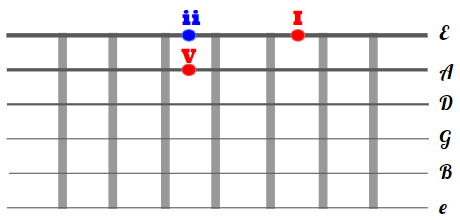
If your root note of the I-chord is on the 5-th string, you can use the following shape to locate the other two chords:
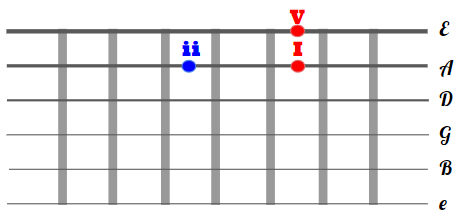
With the chords listed below you can construct different progressions using different shapes. You want to be able to move quickly (240 bpm+) between different the shapes without the need for the “cheat sheet”. But you have to start somewhere!
Major ii-V-I progression
Here are the staring chord shapes you can use to play chords with roots on different strings and with simple alternative voicings.
ii-chord
| m7 | m7 | m9 | m9 |
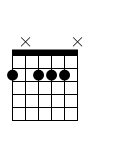
|
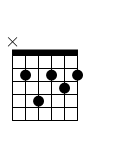
|
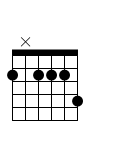
|
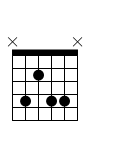
|
V-chord
| 7 | 7 | 13 | 9 |
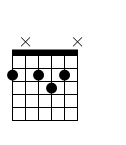
|
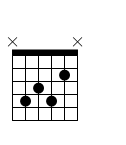
|
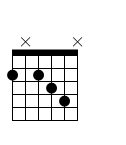
|
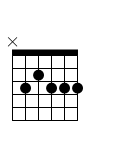
|
I-chord
| maj7 | maj7 | maj6/9 | maj9 |
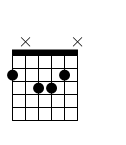
|
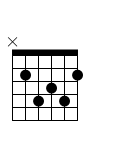
|
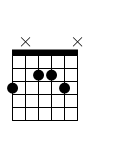
|
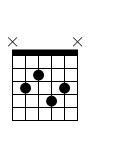
|
Minor ii-V-i progression
ii-chord
The ii-chord in minor progression is always m7b5. Don’t ask. Just remember. The rest can vary.
| m7b5 | m7b5 | m7b5 | |
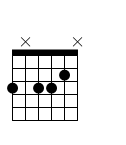
|
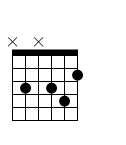
|
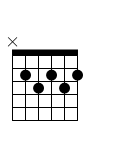
|
V-chord
| 7b5 | 7#5 | 7#9 | 7b9 |
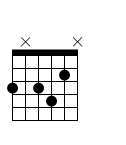
|
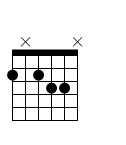
|
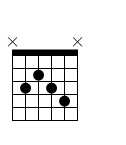
|
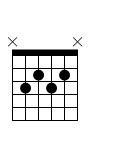
|
i-chord
| m6 | m6/9 | m6 | |
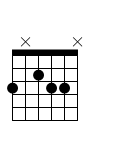
|
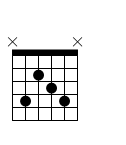
|
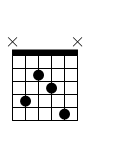
|
Cheat sheet
OK, so you have to learn some chords. But when you open some websites or books you will find so many… Normally I give up browsing after several pages :). Therefore I decided to compile a small “digestable” set of chords as a starting point. I strongly suggest checking out the video links below to get a grasp on how to play those.
To make it a bit more usable I have compiled a small II-V-I cheat sheet, you can download a portable 2 pages on one formatted PDF (and of course it is free!).
The chords above are generated using excellent Chords Generator website.
References
There are numerous articles, sites, books, etc. I found the following ones to be a good starting point.
Reading and in-depth articles:
- Justin Guitar “Jazz Introduction & Basics”. Excellent starting point!
- Jazz Guitar Online. Tons of articles and study materials.
- Matt Warnock. A lot of free materials!
Of course the sites below also have premium materials, but you can get a lot form the free materials already before deciding which one suits your education style better.
As for video materials Youtube comes as first to mind, but there are so many videos! I found the following ones a good starting point.
- Dawsons “Developing your Jazz chops”
- Perhaps a more advanced videos from Jens Larsen would be a good point to continue.
- Jazz Guitar Lessons channel from Marc-Andre Seguin
If you like books a good starting point may be Hal Leonard “Jazz Guitar”. I own several books (about different styles) from Hal Leonard and while I never follow them word by word, exercise by exercise, I find them easy to grasp and good reference material.
Happy playing!


